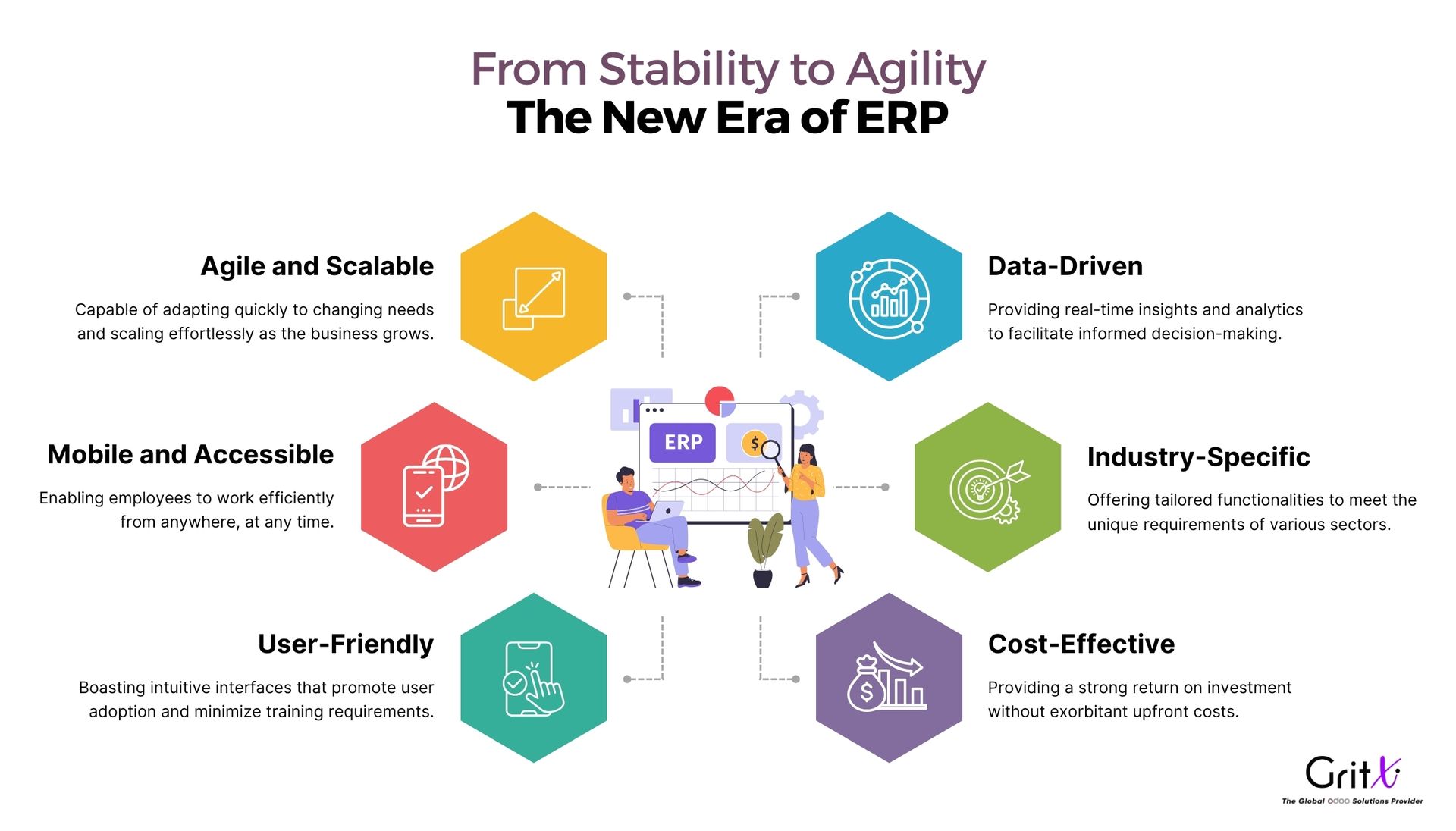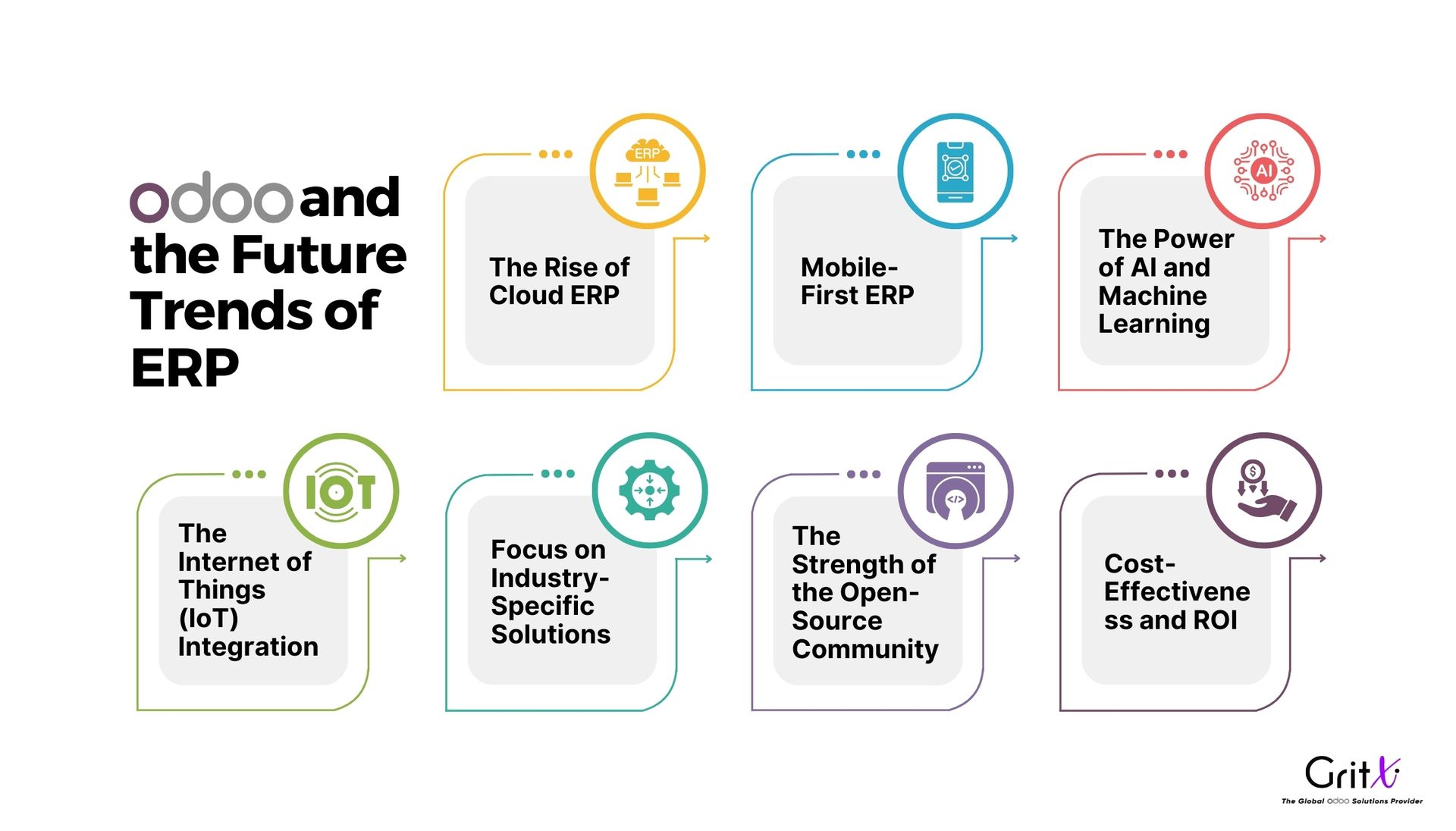In the dynamic and ever-evolving landscape of modern business, the ability to adapt, innovate, and operate efficiently is paramount. At the heart of achieving these critical objectives lies the Enterprise Resource Planning (ERP) system – the central nervous system that integrates and manages a company’s core processes, from finance and accounting to sales, marketing, supply chain, and human resources. However, the traditional perception of ERP as a monolithic, complex, and often expensive undertaking is rapidly becoming outdated. The future of ERP is agile, intelligent, and accessible, and one platform is consistently emerging as a frontrunner in this transformative shift: Odoo.
This blog post delves into the evolving landscape of ERP, dissects the limitations of legacy systems, and meticulously explores why Odoo is not just participating in the future of ERP but actively leading the charge. We will examine its unique architecture, its embrace of cutting-edge technologies, and its inherent advantages that are making it the go-to solution for businesses in Ahmedabad, Gujarat, India, and across the globe.
The Shifting Sands of Enterprise Resource Planning
For decades, ERP systems were synonymous with large-scale, intricate implementations, often requiring significant upfront investment and lengthy deployment timelines. These traditional systems, while powerful in their initial scope, frequently suffered from a lack of flexibility, making it challenging for businesses to adapt to changing market conditions or integrate new technologies. Siloed data, disparate modules with limited interoperability, and complex user interfaces often hindered rather than enhanced operational efficiency.

The modern business environment, characterized by rapid technological advancements, increasing globalization, and evolving customer expectations, demands a different breed of ERP. Businesses today need solutions that are:
- Agile and Scalable: Capable of adapting quickly to changing needs and scaling effortlessly as the business grows.
- Data-Driven: Providing real-time insights and analytics to facilitate informed decision-making.
- Mobile and Accessible: Enabling employees to work efficiently from anywhere, at any time.
- Industry-Specific: Offering tailored functionalities to meet the unique requirements of various sectors.
- User-Friendly: Boasting intuitive interfaces that promote user adoption and minimize training requirements.
- Cost-Effective: Providing a strong return on investment without exorbitant upfront costs.
These demands are precisely what is fueling the evolution of ERP, pushing the boundaries of what these systems can achieve and paving the way for innovative platforms like Odoo.
Odoo: A Paradigm Shift in ERP Thinking
Odoo represents a fundamental shift in how businesses approach enterprise resource planning. Unlike traditional monolithic ERP suites, Odoo is built on a modular, open-core architecture. This means it comprises a comprehensive suite of business applications (or "apps") that can be deployed independently or integrated seamlessly. Businesses can choose and pay only for the modules they need, allowing for a highly customized and cost-effective implementation.
Imagine a textile manufacturing company in Ahmedabad. They might initially require modules for inventory management, sales, and accounting. With Odoo, they can start with these core functionalities and later add modules for manufacturing, quality control, or e-commerce as their business expands and their needs evolve. This pay-as-you-grow approach is a significant departure from the all-or-nothing nature of traditional ERP systems.
Beyond its modularity, Odoo boasts several key characteristics that position it as a leader in the future of ERP:
- True Integration: While many ERP vendors claim integration, Odoo's apps are designed from the ground up to work together seamlessly. This eliminates data silos, streamlines workflows, and provides a unified view of business operations. For instance, a sales order automatically updates inventory levels and triggers invoicing, all within the same integrated environment.
- Extensibility and Customization: Odoo's open-source nature provides unparalleled flexibility for customization. Businesses with specific requirements, whether unique workflows in the pharmaceutical industry in Gujarat or specialized reporting needs for a retail chain, can leverage Odoo's development framework and a vast community of developers to tailor the platform to their exact needs. Odoo Studio, a low-code development tool, further empowers users to customize the system without extensive programming knowledge.
- Modern and Intuitive User Interface: Gone are the days of clunky and complex ERP interfaces. Odoo boasts a clean, modern, and user-friendly design that is consistent across all its modules. This intuitive interface significantly reduces the learning curve, promotes user adoption, and enhances overall productivity.
- Comprehensive Functionality: Despite its modularity, Odoo offers a vast array of business applications, covering virtually every aspect of business management, including CRM, sales, project management, manufacturing, accounting, marketing, HR, and more. This comprehensive suite eliminates the need for multiple disparate systems and the challenges of integrating them.
Leading the Charge: Odoo and the Future Trends of ERP
The future of ERP is being shaped by several key technological and business trends, and Odoo is strategically positioned to not only adapt to these trends but to actively drive them.

- The Rise of Cloud ERP: Cloud deployment offers numerous advantages, including scalability, accessibility, reduced infrastructure costs, and automatic updates. Odoo has embraced the cloud, offering a robust and scalable cloud-based platform that allows businesses in Ahmedabad and beyond to access their ERP system from anywhere with an internet connection. This is particularly beneficial for businesses with multiple locations or remote teams.
- Mobile-First ERP: In today's mobile-driven world, the ability to access and manage business operations on the go is crucial. Odoo's responsive design and dedicated mobile apps ensure that users can access critical information, approve workflows, and perform tasks from their smartphones or tablets, enhancing agility and responsiveness.
- The Power of AI and Machine Learning: Artificial intelligence (AI) and machine learning (ML) are poised to revolutionize ERP by automating tasks, providing predictive insights, and enhancing decision-making. Odoo is actively integrating AI features into its platform, such as intelligent sales forecasting, automated lead scoring in CRM, and smart inventory management suggestions. As AI technology continues to evolve, Odoo's commitment to innovation will ensure that users benefit from these advancements.
- The Internet of Things (IoT) Integration: The increasing connectivity of devices through the Internet of Things (IoT) presents significant opportunities for ERP systems, particularly in industries like manufacturing and logistics. Odoo's flexible architecture allows for seamless integration with IoT devices, enabling real-time data collection for inventory tracking, production monitoring, and predictive maintenance. Imagine a textile mill in Ahmedabad using IoT sensors to monitor machinery performance, with Odoo automatically scheduling maintenance based on real-time data, minimizing downtime and maximizing efficiency.
- Focus on Industry-Specific Solutions: While a core ERP system provides foundational functionalities, many industries have unique requirements. Odoo's modularity and customization capabilities make it ideal for developing and deploying industry-specific solutions. Whether it's the specific regulatory needs of the pharmaceutical sector in Gujarat or the unique inventory management challenges of the diamond industry, Odoo can be tailored to meet those precise demands. Furthermore, Odoo's growing ecosystem of partners often develops specialized modules for niche industries.
- The Strength of the Open-Source Community: Odoo's open-core model fosters a vibrant and active global community of developers, partners, and users. This community contributes to the continuous improvement of the platform, develops new modules, provides support, and shares best practices. This collaborative environment ensures that Odoo remains at the forefront of innovation and benefits from a diverse range of perspectives and expertise.
- Cost-Effectiveness and ROI: Compared to traditional ERP systems with their hefty upfront license fees and implementation costs, Odoo offers a more cost-effective solution, particularly for small and medium-sized enterprises (SMEs) in Ahmedabad. Its modular pricing model allows businesses to start with what they need and scale as they grow, ensuring a strong return on investment.
The Tangible Benefits of Choosing Odoo for Your Business's Future
Adopting Odoo as your ERP solution offers a multitude of tangible benefits that can significantly impact your business's success in the years to come:
- Enhanced Operational Efficiency: Automation of repetitive tasks, streamlined workflows, and seamless data integration across departments lead to significant improvements in operational efficiency.
- Data-Driven Decision-Making: Real-time data and comprehensive reporting capabilities provide valuable insights into all aspects of your business, enabling informed and strategic decision-making.
- Improved Collaboration and Communication: A unified platform fosters better communication and collaboration between different teams and departments, breaking down silos and improving overall synergy.
- Stronger Customer Relationships: Integrated CRM functionalities empower businesses to manage customer interactions effectively, personalize communication, and build stronger, more lasting relationships.
- Optimized Inventory Management: Real-time inventory tracking, automated replenishment alerts, and demand forecasting capabilities help businesses optimize their inventory levels, reduce waste, and improve supply chain visibility.
- Reduced IT Costs: Cloud deployment options minimize the need for expensive on-premises infrastructure and IT maintenance, leading to significant cost savings.
- Future-Proofing Your Business: By choosing a modern, adaptable, and continuously evolving platform like Odoo, businesses can ensure they are well-equipped to navigate future technological advancements and changing market dynamics.
Conclusion: Embracing the Future of ERP with Odoo
The future of ERP is no longer about monolithic systems and complex implementations. It's about agility, intelligence, accessibility, and the ability to adapt to the ever-changing needs of modern business. Odoo embodies these principles, offering a modular, scalable, and innovative platform that is empowering businesses in Ahmedabad, Gujarat, India, and across the globe to streamline their operations, drive growth, and embrace the future with confidence.
By choosing Odoo, businesses are not just implementing an ERP system; they are investing in a future-proof solution that will continue to evolve and adapt alongside their growth. As technology continues its relentless march forward, Odoo's commitment to innovation and its vibrant open-source community ensure that it will remain at the forefront of the ERP revolution, leading the way towards a more efficient, connected, and intelligent future for businesses of all sizes.
Are you ready to embrace the future of ERP and unlock the full potential of your business? Explore the possibilities with Odoo and discover why it is the leading choice for organizations looking to thrive in the years to come. Consider exploring Odoo's extensive suite of applications and connecting with local Odoo partners in Ahmedabad to learn how this powerful platform can transform your business operations. The future of ERP is here, and Odoo is leading the way.
The Future of ERP: Why Odoo is Leading the Way